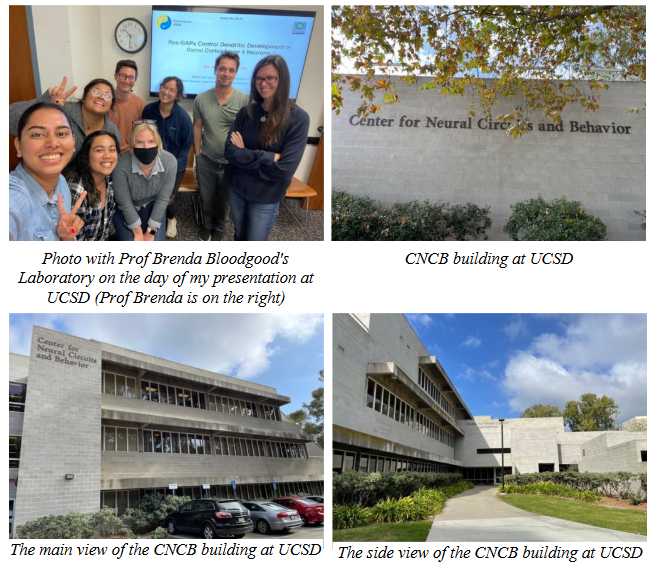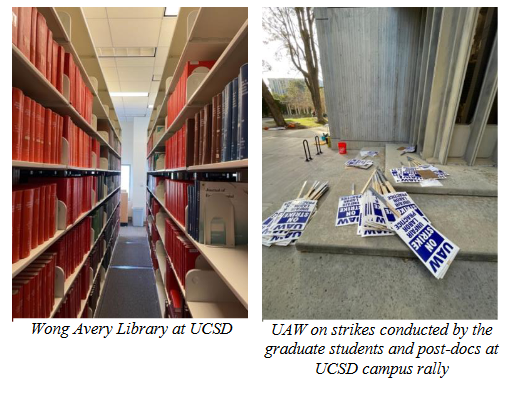- HOME
- Research exchange activities
- Dispatch of Researchers
- 【Intenship Report】Ms. Subba Rao Madhura (Multi-dimentional Imaging Laboratory, IRCMS)
【Intenship Report】Ms. Subba Rao Madhura (Multi-dimentional Imaging Laboratory, IRCMS)
Ms. Subba Rao Madhura is a 4th-year graduate student of Multi-dimentional Imaging Laboratory at IRCMS. From November 11th to December 9th 2022, she visited the Laboratory of Prof. Brenda Bloodgood, Center for Neural Circuits and Behavior, US San Diego, CA, USA and received guidance from Prof. Brenda Bloodgood and other researchers. Read her experience below.
I am very happy and grateful for the support from the JSPS core-to-core program to conduct this overseas internship in the USA. From Novermber 11th, 2022, until December 9th, 2022, I stayed in San Diego, California, USA, and visited the Laboratory of Prof Brenda Bloodgood, Center for Neural Circuits and Behavior, US San Diego, CA, USA.
This was my first time visiting the USA and it has been a very good opportunity to learn about the US work system, lab culture,and environment, as well as to attain knowledge from diverse researchers and neuroscientists coming from various backgrounds and fields. I could not enter the campus for the first couple of days due to the lab or any ongoing experiments at their laboratory. However, I tried to make the best use of my stay by emailing other Prof to meet in person from the same institution and other research institutions such as Salk Institute for Biological Studies and The Scripps Research Institution. I also had a campus visit to The Universityof Southern California in Los Angeles.
During my stay at Brenda's lab, I had a tour of the laboratory, attended lab meetings, and also gave a presentation about my previous work data and brief summary of the research project and results that we obtained so far in my Ph.D. research project "Ras-GAPs Control Dendritic Development in Barrel Cortex Layer 4 Neurons". I got a lot of questions and discussions about our findings. We also discussed the possible future postdoc opprtunities, post-doc fellowships, and future steps ahead. So far I have obtained some cellular and molecular data from my study, so in order to proceed ahead we want to look into transcriptomics by collaborating on our genes of interset NFO and NPAS4.
Furthermore, I also got a chance to have a chat discussion with Prof Takaki Komiyama, who shares their lab space with Prof Brenda on the same floor. We discussed our study using the in-utero electroporation technique which can only label barrel cortex layer 4. Some of the key questions which were asked about my work are as follows: Does it also label layer 5 too because in utero electroporation technique mainly labels dividing cells and by the time layer 4 has developed layer 5 too might have been developed, isn't it? What kind of sectioning do we do for histology? transverse? While giving an electric impulse how is the positioning of the electric impulse given positive side towards the injected site? What orients the L4 neurons to have their dendritic patterning towards the barrel center? Are there any signal-specific molecules that guide them in their orientation?
Komiyama's lab is mainly working on Huntington's disease model using mice studies, behavioral studies, coding, and programming data analysis. AVV viral infections are mainly used to mimic the disease models in their lab. One of his post-doc candidates gave me a tour of their laboratory and explained to me about their research on behavioral studies which focuses on motor skill learning in the motor cortex of adult mice using two-photon microscopy. I also got to learn about 2p ram microscopy from Thorlabs which assists to obtain high-speed functional imaging across several brain regions operating in concerts which I was not aware of or seen in Japan.
I have also had several interesting and fruitful discussions with many other professors from other institutions, post-docs, and graduate students which have encouraged and inspired me a lot. Thus, I hope to use their feedback and suggestions for my current Ph.D. work after coming back to Japan, future career applications, and interviews and to conduct a successful research career.


